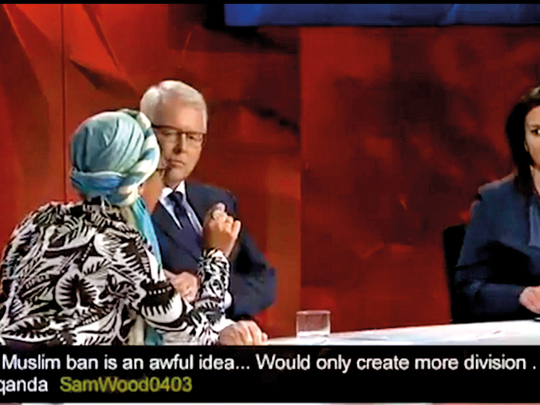
SYDNEY, Australia — The post on Facebook this week may have seemed innocuous enough: “Lest. We. Forget. (Manus, Nauru, Syria, Palestine ...)”
But it has led to furious criticism of Yassmin Abdel-Magied, the Muslim activist and television host who posted it — not just from Facebook users, but from national news outlets and even a Cabinet minister. The Daily Telegraph, a tabloid, called for Abdel-Magied to be fired on its front page Wednesday.
The anger over the Tuesday post — which referred to Australia’s widely condemned offshore detention centers for asylum seekers on the Pacific islands of Manus and Nauru — focused on its timing, on Anzac Day, a revered holiday that commemorates Australians who died in overseas wars. Many of Abdel-Magied’s critics accused her of politicising a day of remembrance.
But some Australian Muslim women saw more to it than that. They noted that while critics of Islam here often charge that it keeps women submissive, the response to Abdel-Magied — a 26-year-old feminist who founded an organisation called Youth Without Borders — shows that a Muslim woman can also raise their ire by speaking out.
“It’s an interesting switch from saying Muslim women are victims and forced to stay within their homes and secluded and silent, to this victimisation of an outspoken and very successful Muslim woman,” said Shakira Hussain, a research fellow at the Asia Institute of Melbourne University who wrote “From Victims to Suspects: Muslim Women Since 9/11.”
Abdel-Magied, a Sudanese-born Australian who appears on a weekly news program called “Australia Wide” on ABC, the national broadcaster, deleted the post and apologised. “It was brought to my attention that my last post was disrespectful, and for that, I apologise unreservedly,” she wrote.
A post on her Facebook page now reads simply “Lest we forget,” with no reference to Syria, the Palestinians or the detention centers, many of whose inmates are Muslim.
On Wednesday, ABC said in a statement that Abdel-Magied’s decision to remove the original post and apologise was “appropriate.”
But vitriol from social media users continued, and an online petition calling for her dismissal from ABC had more than 20,000 signatures by Wednesday night.
“How dare you hijack an Australian special day for your personal agenda,” wrote one Facebook user, who added, “You were born in Sudan & we all know you are Sunni.” Another user wrote, “You are a disgrace to this country and should be deported.”
Elected officials also weighed in. Immigration Minister Peter Dutton, whose responsibilities include the offshore detention centers, told The Daily Telegraph, “It is a disgrace that on our most significant national day to mark the passing of people who have defended this country, this advocate seeks to make political mileage.”
Tasneem Chopra, chairwoman of the Australian Muslim Women’s Center for Human Rights, said the timing of Abdel-Magied’s comment was “insensitive,” but she said the ensuing controversy reflected a double standard for Muslim voices in the public arena.
“It’s been an overkill from the tabloid media,” Chopra said. “There’s a lack of consistency in the way Muslims are treated for transgressions when compared to the mainstream. There is a perception if you’re not a white Australian it can’t be considered an Australian voice.”
Hussein also saw race as a factor. “Racists are most bothered by minorities when they start to succeed,” she said. “When they are safely marginalised they might lament their victimisation.”
Anzac Day, which commemorates the landing of Australian and New Zealand forces in Turkey during the Gallipoli campaign of World War I, has been the occasion for controversial remarks before. In 2015, another state broadcaster, SBS, fired a journalist, Scott McIntyre, after he said the holiday was about “remembering the summary execution, widespread rape and theft committed by these ‘brave’ Anzacs.”
Randa Abdel-Fattah, an Australian academic and author who has written about prejudice against Islam, said it was “amusing” that many of Abdel-Magied’s critics had chided her for politicising Anzac Day. “When is war not political?” Abdel-Fattah said.
She feared the backlash would have a “chilling effect” on young women from minority backgrounds asserting themselves in the public sphere. “The campaign is so brutal,” Abdel-Fattah said. “At that age you’re already trying to figure out who you are, and there should be room to make mistakes. Although I don’t think this was a mistake.”
There were also calls for Abdel-Magied to be fired in February, after she called Islam “the most feminist religion” during a clash with a conservative politician on another ABC program, “Q&A.”
Abdel-Fattah said the latest furore reflected schisms in Australia’s multicultural society, as diverse voices challenged establishment figures in a new media landscape. “She’s a Muslim woman, and she’s black. She’s assertive, integrated, and that really” makes people angry, Abdel-Fattah said.
“It wasn’t as though she was even attacking Anzac Day,” she said. “She was saying let’s extend remembrance to all victims of war.”
—New York Times News Service












